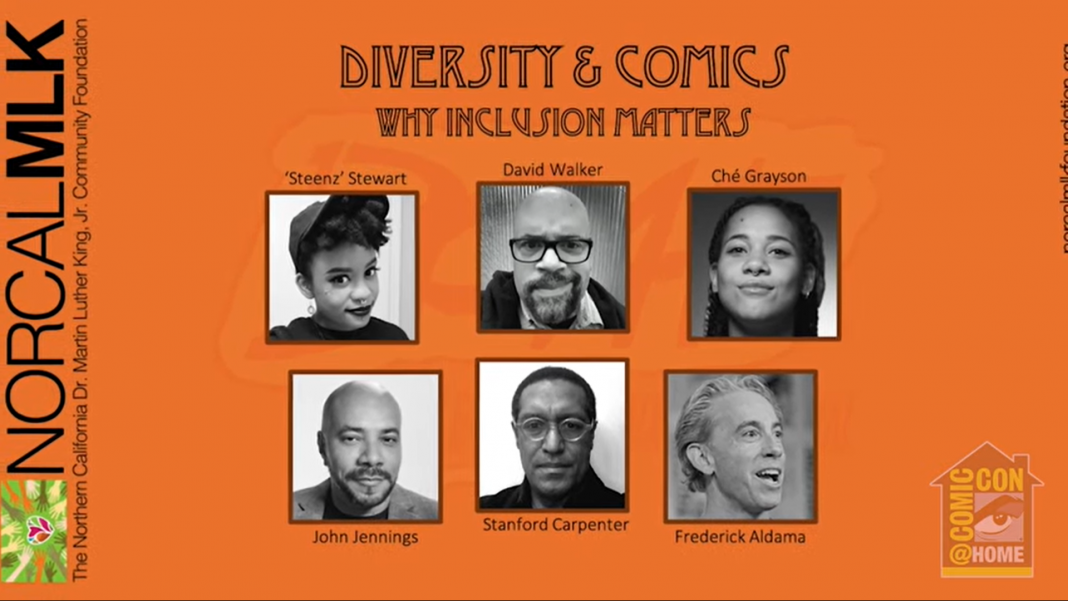2020 feels as though we’re all living through manifestations of zig-zagging brainstorm ideas drummed up by a comic book publisher planning their next universe event shake up. Across the world, and throughout the U.S., the COVID-19 epidemic has severely impacted everyone, and the Black Lives Matter protests, sparked by the murder of Black individuals, including Breonna Taylor and George Floyd, have caused collective examination of racism in all aspects of society.
On Saturday, these topics and their intersection were discussed in a panel called Diversity and Comics: Why Inclusion and Visibility Matter; its incredibly talented line-up included moderator Stanford Carpenter (Chair, Black & Brown Comix Arts Festival), and guests Chelsea ‘Ché’ Grayson (Rigamo), Frederick Aldama (Reel Latinxs: Representation in U.S. Film and TV), Christina ‘Steenz’ Stewart (Heart of the City), David F. Walker (Bitter Root), and John Jennings (Kindred: A Graphic Novel Adaptation).
“To put it lightly – this has been a tough three months. We started by going into lockdown for a pandemic…” Carpenter mentioned at one point when talking about these eventful times. “It is lightly,” said Jennings jumping in with a weary laugh that was echoed amongst the panel. One topic that was discussed was the correlation between the pandemic and the increased awareness and understanding of the Black Lives Matter movement.
“I actually think that the pandemic – having so many people be home and being able to watch the 24-hour news cycle really queued up the uprisings and the protests around Black Lives Matter,” said Carpenter. “It’s not just that we could see it. All of the sudden we’re seeing it over and over again. A lot of people quite frankly had a lot more time in front of the TV.”
Grayson mentioned how she previously went to the Ferguson protests when she was in film school, which she found to be a powerful experience. Upon her return to school she was called “militant” by her White classmates for joining the Black Lives Matter movement and now, years later, she’s noticed a shift in mindset by these same White people in recognizing the importance of Black Lives Matter.

“It’s the same movement, but they’re understanding it differently, and now they understand my anger,” said Grayson. “We kind of abandoned needing to change those minds but they’ve changed, and they understand and that’s very interesting. I think they understand because of the pandemic – I think because of the lack of distraction.”
The final minutes of the panel shifted to a discussion surrounding the authenticity of organizations attempting to increase diversity in the wake of the Black Lives Matter protests and how the creatives were processing it.

“We need to think about what kind of changes are you making and are they worthwhile,” said Stewart. “While some places want to do ‘Oh here’s an internship for a Black person at this publisher.’ You have to think about why do you assume that we need an internship and not a job? Who’s going to be a mentor in that situation? You can’t have an internship without a mentor.”

Aldama mentioned how important it is that creatives work in solidarity to change the power structure of creative communities such in comics or writing, which haven’t been in favor of People of Color.
“[In other areas] we’re forcing people to decolonize,” said Aldama. “We need to do that too with our structures of creativity, I think, and what can that look like tomorrow for us.”
Miss any of our other SDCC 2020 coverage? Click here for much more!







